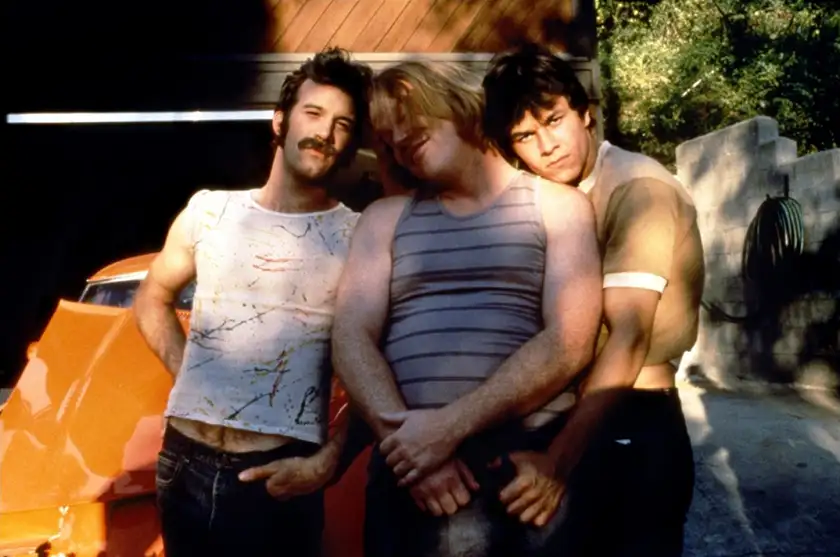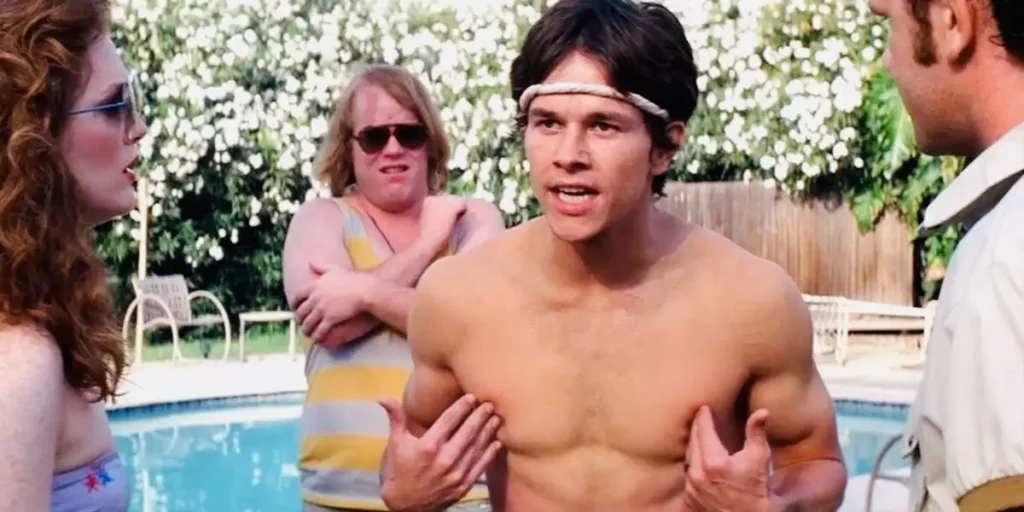Paul Thomas Anderson’s Boogie Nights is a barnstorming journey through the surprising world of the 1970s and 80s porn industry.
Director: Paul Thomas Anderson
Genre: Drama
Run Time: 155′
Release Date: October 10, 1997
Where to watch: on digital & DVD
There is a fine line between bravura filmmaking and cockiness. That’s a statement one, nowadays, wouldn’t necessarily associate with three-time Oscar nominated director Paul Thomas Anderson. However, re-watching his real breakthrough film Boogie Nights, it’s hard for that thought not to be summoned.
Watching it again for the umpteenth time, every lengthy and intricate oner, every tense set-piece, every needle-drop or bold ellipsis, you can’t help but think: “Come on, Paul, is that just one step too far?”. But it’s not – it’s instead the birth of one of America’s finest auteurs.
PTA began his feature film Hollywood career a year earlier with Hard Eight, a solid, character focused debut, but it was Boogie Nights that cemented PTA as a truly great director. Now, after a promising debut, you might get scooped up by Kevin Fiege or Kathleen Kenedy, but due to the 90s boom of indie cinema – mostly the obscene financial success of Pulp Fiction – PTA was given the reins, and $15 million, to make a passion project based on his 1988 short The Dirk Diggler Story. With this freedom came his bravura filmmaking.
It’s right there from the opening tracking shot, detailing the allure of nightclubs and the life of these porn industry bigwigs, which is the basis of the film. Rivalling the Copacabana tracking shot from Goodfellas is certainly not a bad way to start your film, and from this opening, intoxicating scene the audience is hooked onto the lives of these eccentric people. The reason being that Boogie Nights is just ridiculously fun; you can’t take your eyes off PTA’s well-drawn and hilarious characters.
Often, the addictively fun, 100 mile per hour movies are either based in the world of crime (Goodfellas, Reservoir Dogs) or centre on despicable people (The Wolf of Wall Street, The Big Short), but Boogie Nights isn’t. It’s based on people you like – truly rendered characters whose company you enjoy. It’s a pleasant and almost radical idea to have this 2.5 hour pacey opus based on decent humans, trying to make their art and grasping for happiness.

Boogie Nights follows a pornography studio in the 1970s and 80s, their tumultuous place in an influx industry, and the band of misfits that populate the studio. This band of misfits’ frontman is Eddie Adams (Mark Whalberg), soon to be Dirk Diggler, who is the focal point of the film. Others, to just name a few include: the cheerful, but deep down fragile, pornstar Rollergirl (Heather Graham); the blithe loveable idiot, pornstar Reed (John C. Reilly); the singular, pornstar Buck (Don Cheadle), who shadows as a music stereo store salesman; and Scotty (Phillip Seymour Hoffman) the sound guy, whose character is thin on paper but is made heartfelt by Hoffman’s irresistible performance.
The characters that I mention above offer the film its life and vitality through the course of their mad and, more than occasionally, sad lives. Despite the major parts of the movie being a fun romp, what makes Boogie Nights so special is its balance of joy and despair. Equally memorable moments are Reed’s reinvention as a cheap, and still pornographic magician, and the studio’s main female star, Amber Waves (Julianne Moore) breaking down in tears after a meeting with her ex-husband, about the custody of her only biological child, goes sour. Moore really is the adhesive the film needs, the heartbreaking mother figure to everyone apart from her real son. This is where the film’s core theme comes into play: the chosen family.
Walhberg’s Dirk, formally Eddie Adams, is essentially forced out his childhood home by his cold, bitter parents and is soon welcomed open arms into porn studio owner Jack Horner (the transformed Burt Reynolds) and Amber Waves’ sunny, idyllic villa. You don’t learn the background of many of the other characters but you can’t help but think Eddie’s situation is a familiar tale. Outcast from regular society, Eddie, Rollergirl, and Reed are loved by an unconventional makeshift family of older porn actors, producers and sound guys, just to name a few. Home and family are where you’ll be accepted when everything turns to sh*t, so when everything turns to sh*t for Dirk – including but not exclusively a hilariously bad, and unreleased pop song, and surviving Alfred Molina with a rifle – he speedily returns to Jack Horner’s porn paradise and is fastly accepted back into the mix.
Entertainment over substance in films is a hot topic, with Alex Garland’s Civil War – a thrilling but perhaps hollow film, due to its posturing as a divisive film, while actually just politically sitting on the fence – making headlines. But despite Boogie Nights’ supreme thrills, substance is not an element it lacks. It takes on ego, character reinvention, societal attitudes towards porn and violence, to name a few – but when God Only Knows is playing over the film’s dying scenes, family, and its boundless limits, is what’s on the mind.
Chosen family being Boogie Nights’ primary theme is nothing special, but PTA conveys it in such a way that it feels revolutionary. It gives you hope that, if such potentially tragic characters can find peace and meaning, so can you. This profound feeling, on top of the emotions brought on by watching an immensely entertaining rollercoaster of a film, make Boogie Nights a masterpiece of American cinema.
Boogie Nights is now available to watch on digital and on demand.
Loud and Clear Reviews has an affiliate partnership with Apple, so we receive a share of the revenue from your purchase or streaming of the films when you click on the button on this page. This won’t affect how much you pay for them and helps us keep the site free for everyone.

